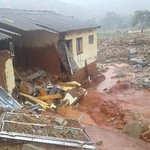Bible translation: Even with a few words
By Tohru Inoue | Sudan and South Sudan in East Africa

Photos by SIM Stories East Africa
Years ago, I attended the dedication of the Shilluk language Bible in South Sudan. It was held at the outdoor stadium in town. Even today, the Shilluk tribe maintains a system of monarchy, and their king was in attendance where he addressed a jubilant crowd. Churches from across the region had sent their choirs to be part of the worship. Each choir was wearing their Sunday robes in distinctive denominational colours, bearing crosses at the front. Everything about the day was big, colourful and triumphant.

I remember the four missionary women they honoured that day. They stood dwarfed by the towering South Sudanese clergy. All four women were white haired and had likely flown out from retirement for one last trip to witness the culmination of their life’s work.

Until then, I had always understood implicitly that Bible translation was lifelong work but had never really realised just what that meant.
Before all the fanfare of a dedication, it's years spent checking and rechecking minutiae. It’s pursuing, through eye-watering monotony, a single goal that will require decades of work, if not the entirety of a working life.
Sing and his wife Emily are Bible translators. I naively thought that Sing might finish the work on the two languages he currently has going and then work on some other languages later. But the languages he's working on now will likely be his companions for the rest of his life. And he may not even live to see the completed translations in either one.
When Sing and Emily were at university but not yet acquainted, they heard the director of Wycliffe Bible Translators (Hong Kong) give a presentation on the hundreds of millions who couldn’t read the Bible in their heart language. That immediately struck a chord with Sing. He was from Hong Kong where English is an official language. It’s taught as a subject in school from a young age, but even after all the years of study, there was still something slightly foreign about reading the Bible in English for him.
The Wycliffe director went on to explain that translation work also needed technically minded people. Sing, who was studying electronic engineering, had that skillset. He considered going into translation during a short-term trip to the remote island of Vanuatu where he witnessed it firsthand.
God was calling him.
While he and Emily were dating, they began a journey to train as translators. They studied anthropology, language learning, linguistics, phonetics, phonological analysis, grammatical analysis, literacy, orthography design, sociolinguistics, semantics and translation. They also did five years of Bible school. It took them 10 years to complete all that and become eligible to start the process of being certified as translators. That required yet more testing and a year doing linguistics in Australia. After all that, they were finally at the stage of picking a language to focus on. From among the thousands that were left untranslated, two choices presented themselves and they settled on one in Africa.
After all those years of study, training and testing they could now finally get going. But none of Sing’s pre-field work had prepared him for the work that lay ahead.
He was going to be working with a group of people whose language hadn’t been developed into a written form yet. No one had ever written or read in their mother tongue. They had to develop the written language. They had to figure out how to spell words and how to use consistent grammatical structures. Then they needed to develop biblical language that didn’t exist to translate words that only ever appear in the Bible, like "tabernacle.” If there weren’t equivalent terms, they would need to create new terms and test them out in the community. After the orthography had been established, the consistency in grammar ironed out and the new biblical terms agreed upon, they would have to address the issue of community literacy without which none of this would make sense.
Even surgeons, after long years of study and training, don’t have to start with welding together the operating table, installing plumbing and electricity in the theatre and then sewing their own scrubs. But for this community, literacy itself was a new thing.
Sing is aware he may not see the day when he can hold the completed translation of the Bible in a single book. But for him, it’s not essential that he finishes the entire Bible before his life is through. For him, the goal is simply that people interact with the Word of God and be transformed. And he showed me that you don’t need all of the Scriptures to be transformed. It can happen even with little bits of it.
A man from the community listened to the audio recording from the translated work.
He said, “My son, this is the second time for me to hear your recordings. Right now, I only listened a few times but I got benefit, I am able to tell other people about what I heard from these recordings … since I listened to your recordings, it [became clear to] me to follow Christ.”
Every six months, when the newly completed bits of material go back to the community for checking, people’s lives are changed.
“[The Bible] dedication, for me, is not that important,” Sing says. “Even finishing is not a must.” He just wants people to read the Bible and be transformed.
His hope runs deeper than a stadium full of people cheering and dancing. It’s more than listening to a tribal monarch addressing the crowds. He spends his days, months and years in front of a screen checking spelling and commas because he believes God can do miracles through the Scriptures.
Even if He’s using just a few words.
Help translate the Bible
Are you eager for more communities to have God's Word in their heart language? You can support Bible translation in East Africa by giving to project 98105. Visit our donation page and select the country nearest you!
Related stories

Uruguay immigrants are putting down New Roots Duplicate 1
Uruguay has a large immigrant population, and students from the vocational programme at the Biblical Seminary of Uruguay, a partner of SIM, realised many foreigners were finding it difficult to adjust to their new home. New Roots ministry was formed to assist these newcomers!
Zimbabwe new stories 2 only en-gb
Short Summary
Zimbabwe new stories
short summary

